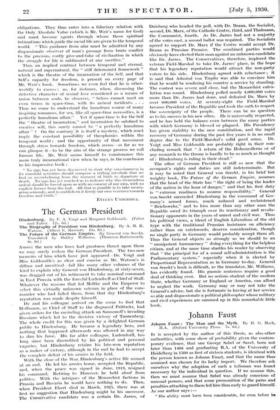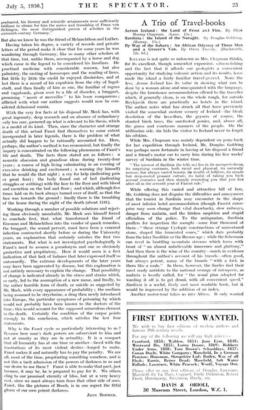Johann Faust
Ir is accepted by the author of this thesis, as also other authorities, with some show of probability given the contem. porary evidence, that one George Sabel or Save!, born not later than 1488 and graduating B.A. of the University of Heidelberg in 1509 as first of sixteen students, is identical with the person known as Johann Faust, and that the name thus assumed was chosen for its lucky import. We therefore ask ourselves why the adoption of such a talisman was found necessary by the individual in question. If we assume this, then we must assume that Sabel was already conscious of unusual powers, and that some premonition of the pains and penalties attaching to them led him thus early to guard himself. As our author says :- " His ability must have been considerable, for even before he
graduated, his literary and scientific attainments were sufficiently brilliant to obtain for him the notice and friendship of Franz von Sieldngen, the most distinguished patron of scholars in the sixteenth•century Germany.'
But also we know he was the friend of Melanchthon and Luther. Having taken his degree, a variety of records and private letters of the period make it clear that for some years he was wandering through Germany, like so many other scholars at that time, but, unlike them, accompanied by a horse and dog which came in the legend to be considered his familiars. He practised medicine with considerable renown, but also palmistry, the casting of horoscopes and the reading of faces. But little by little the credit he enjoyed diminishes, and at last there is a record of his expulsion from the city of Ingot- stadt, and then finally of him as one, the familiar of rogues and vagabonds, given over to a life of disorder, a braggart, promising " moats el merreilles" to his boon companions ; afflicted with what our author suggests would now be con- sidered delusional mania.
With the very few facts at his disposal Mr. Meek has, with great ingenuity, deep research and an absence of redundancy only too rare, garnered up what is relevant to his thesis, which is a model of its kind. Then, since the character and strange death of this actual Faust find themselves to some extent incorporated in later legends, there is the problem of what actually did happen to be rationally accounted for. Here, perhaps, the author's method is too economical, but finally the inquiry is concentrated on the following phenomena of Faust's life and death. The facts there stated are as follows : a neurotic obsession and grandiose ideas during twenty-four years ; a course of high living culminating in an evening of excessive drinking and excitement ; a warning (by himself) that he would die that night ; a cry for help (indicating pain or great fear) ; the body found out of bed (indicating struggles or writhing) with the face to the floor and with blood and excretion on the bed and floor ; and which, although five times laid on its back always turned over of itself, so that the face was towards the ground : finally there is the trembling of the house during the night of the death (about 1541). Working through a number of possible solutions and reject- ing those obviously unsuitable, Mr. Meek secs himself forced to conclude first, that what transformed the friend of Erasmus and Melanchthon into the vendor of quack remedies, I the braggart, the sexual pervert, must have been a venereal infection contracted shortly before or during the University years, an explanation that certainly satisfies the first two statements. But what is not investigated psychologically is Faust's need to assume a pseudonym and one so obviously protective and propitiatory. Here it would seem is a first indication of that lack of balance that later expressed itself so untowardly. The extreme developments of the later years may have been aggravated by disease, but this explanation is not entirely necessary to explain the change. That possibility of change is indicated already in the stress and strains which, so early, led to the assumption of a new name, and finally, to the rather horrible form of death, or suicide as suggested by Mr. Meek, with every appearance of probability ; the medium being assumed to be strychnine, a drug then newly introduced into Europe, the particular symptoms of poisoning by which would not probably have been known to the doctors of the time ; this would account for the supposed miraculous element in the death. Certainly the condition of the corpse points strongly to this conclusion, which satisfies the last four statements.
Why is the Faust cycle so particularly interesting to us ? Because here man's dark powers arc subservient to him and not at enmity as they are in actuality. It is a compact that all humanity has at one time or another—faced with the frustrations of its most violent desires—longed to make. Faust makes it and naturally has to pay the penalty. We are all, most of the time, propitiating something somehow, and is not this a tacit admission of the powers of darkness in us and our desire to use them ? Faust is able to make that pact, just because, it may be, he is prepared to pay for it. We others cling to our promised eternity of bliss, but at a very heavy cost, since we must always turn from that other side of ours. Faust, like the pictures of Bosch, is in one aspect the fitful gleam of our own potent darkness.
JOHN RODKEB.











































 Previous page
Previous page